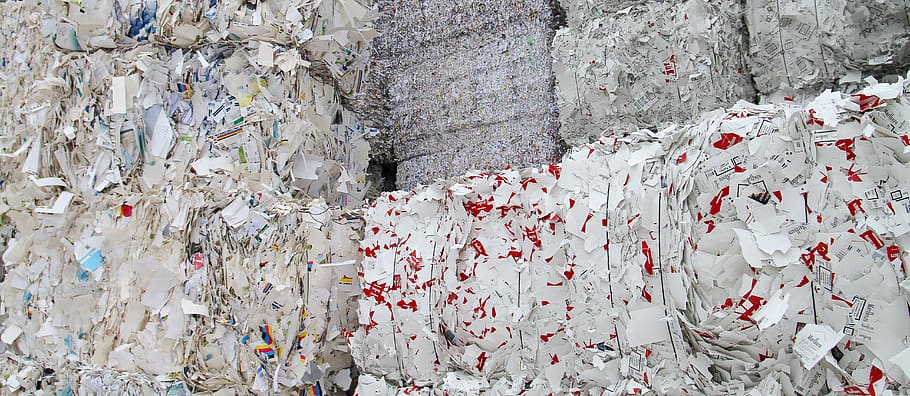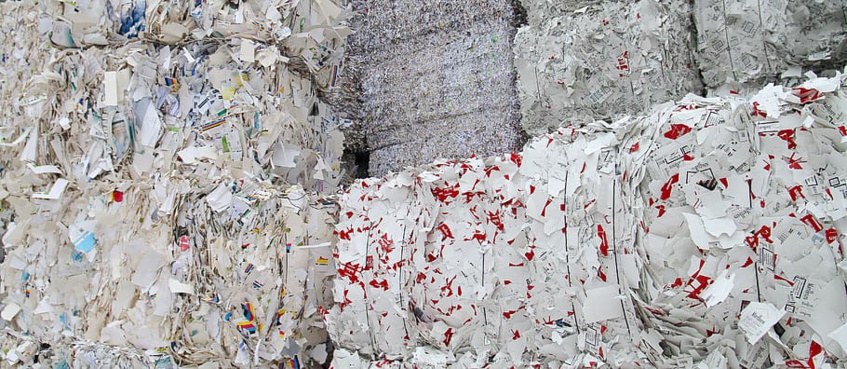On average, each person in the United States uses about 141 rolls of toilet paper every year, which is the highest rate globally. As the urgency of climate change pushes companies to seek ways to lower their carbon footprint, a discussion has emerged about whether recycled or non-recycled (virgin) fibers are a greener option for manufacturing the vast amount of toilet paper consumed in the U.S.
The term “recycled” often brings to mind images of earth-friendly practices, conservation of natural resources, and awareness of climate change. This is understandable as recycling can be an effective way to decrease waste going to landfills (particularly single-use plastics), which is a significant contributor to global warming.
However, when choosing paper products such as toilet paper and paper towels, it’s important for organizations to evaluate the environmental impact of the entire life cycle of the product, not just whether it’s made from recycled or virgin fibers. A thorough analysis can often uncover potential drawbacks of recycled paper and demonstrate how virgin fibers might be a better choice in terms of sustainability and quality.
Challenges with Recycled Paper
Understanding the potential issues associated with the use of recycled fibers, which may not be immediately apparent, can aid facility managers in making more informed choices. These challenges include a limited life cycle, inferior quality, and potentially deceptive branding.
Recycling paper has its limits: The length of paper fibers decreases each time they are recycled. Consequently, paper products can only be reused about five to seven times. Furthermore, consumers cannot determine how many times fibers have been recycled, making it challenging to assess the efficiency of some recycled products. Quality issues with recycled fibers: Overused fibers can lead to inconsistencies, poor quality, and subpar performance.
This could result in a less than satisfactory restroom experience that could negatively impact a brand’s reputation. Toilet paper and paper towels made from recycled fibers also offer less absorbency and softness than those made from virgin fibers. As studies show that strength, absorbency, and softness are the three attributes Americans value most in public restroom toilet paper, facility managers should prioritize these qualities as well as environmental impact when choosing paper products.
The term ‘recycled’ is not always clear: Companies often boldly label their products as “green,” “sustainable,” or “recycled.” However, if a product’s packaging does not specify that the paper product is “100% recycled,” it may have been produced using energy derived from coal. As this contributes to greenhouse gas emissions and uses excess energy, recycled paper that does not meet the 100% mark might as well not have been recycled at all. Lastly, 30-35% of the fibers used to make tissue paper and pulp are lost during the recycling process. A more efficient use for recycled fibers might be in the production of materials like packaging paper and cardboard, which generate less than 20% of the waste compared to recycled tissue paper.
The Truth about Virgin Fibers
When dealing with paper made from virgin fibers, it’s crucial to consider its source. Some manufacturers employ innovative, sustainable practices and cutting-edge technologies that make virgin paper production an environmentally responsible choice. Look for products certified by the Forest Stewardship Council (FSC), a non-profit organization that ensures products come from “responsibly managed forests that provide environmental, social and economic benefits.” Once a supplier finds a paper manufacturer that responsibly uses virgin fibers, they may discover that virgin fibers offer several advantages, including reducing environmental impact, enhancing the quality of their product inventory, and improving the hygiene of their paper products.
In terms of sustainability, recent studies have illuminated the environmental impact of virgin fibers versus recycled fibers. In comparisons between toilet tissue made from virgin fibers and recycled fibers, researchers found that even though it contained twice as much fiber, the virgin product emitted fewer greenhouse gases, produced less waste and required less water than the product made from recycled fibers. These studies took into account the entire lifecycle of the products, including the environmental damage caused during the production process of recycled products. The researchers also discovered that the “global warming potential,” or the amount of carbon dioxide equivalents released during a product’s lifecycle, was higher in the recycled option.
In terms of quality, paper made from virgin fibers boasts superior absorbency, improved ink color and retention, and is softer and more robust. Due to their strength and reliability, products made from virgin fibers offer customers a superior experience, a crucial factor in a time when negative restroom experiences can rapidly become widespread.
Besides environmental and quality benefits, the appropriate virgin paper products also offer superior hygiene compared to recycled products. The contemporary production process of virgin fibers is significantly more sanitary than that of recycled paper mills and generates the required energy by burning waste wood instead of depending on electricity or fossil fuels like recycled mills. The process of producing virgin fibers does not create bacteria-friendly starches and does not leave behind any slime found in some recycled products.
Dispelling Misconceptions about Paper Products
When procuring paper products such as toilet paper and paper towels, facility managers should be cautious of labels like “green,” “sustainable,” or “recycled.” A detailed examination of the differences between virgin and recycled fibers can help reveal the hidden drawbacks of recycled paper. Contrary to popular belief, products made from virgin fibers are actually ideal for businesses aiming to reduce their carbon footprint, enhance the quality of their paper products, and provide a pleasant restroom experience for guests.
The term “recycled” often brings to mind images of earth-friendly practices, conservation of natural resources, and awareness of climate change. This is understandable as recycling can be an effective way to decrease waste going to landfills (particularly single-use plastics), which is a significant contributor to global warming.
However, when choosing paper products such as toilet paper and paper towels, it’s important for organizations to evaluate the environmental impact of the entire life cycle of the product, not just whether it’s made from recycled or virgin fibers. A thorough analysis can often uncover potential drawbacks of recycled paper and demonstrate how virgin fibers might be a better choice in terms of sustainability and quality.
Challenges with Recycled Paper
Understanding the potential issues associated with the use of recycled fibers, which may not be immediately apparent, can aid facility managers in making more informed choices. These challenges include a limited life cycle, inferior quality, and potentially deceptive branding.
Recycling paper has its limits: The length of paper fibers decreases each time they are recycled. Consequently, paper products can only be reused about five to seven times. Furthermore, consumers cannot determine how many times fibers have been recycled, making it challenging to assess the efficiency of some recycled products. Quality issues with recycled fibers: Overused fibers can lead to inconsistencies, poor quality, and subpar performance.
This could result in a less than satisfactory restroom experience that could negatively impact a brand’s reputation. Toilet paper and paper towels made from recycled fibers also offer less absorbency and softness than those made from virgin fibers. As studies show that strength, absorbency, and softness are the three attributes Americans value most in public restroom toilet paper, facility managers should prioritize these qualities as well as environmental impact when choosing paper products.
The term ‘recycled’ is not always clear: Companies often boldly label their products as “green,” “sustainable,” or “recycled.” However, if a product’s packaging does not specify that the paper product is “100% recycled,” it may have been produced using energy derived from coal. As this contributes to greenhouse gas emissions and uses excess energy, recycled paper that does not meet the 100% mark might as well not have been recycled at all. Lastly, 30-35% of the fibers used to make tissue paper and pulp are lost during the recycling process. A more efficient use for recycled fibers might be in the production of materials like packaging paper and cardboard, which generate less than 20% of the waste compared to recycled tissue paper.
The Truth about Virgin Fibers
When dealing with paper made from virgin fibers, it’s crucial to consider its source. Some manufacturers employ innovative, sustainable practices and cutting-edge technologies that make virgin paper production an environmentally responsible choice. Look for products certified by the Forest Stewardship Council (FSC), a non-profit organization that ensures products come from “responsibly managed forests that provide environmental, social and economic benefits.” Once a supplier finds a paper manufacturer that responsibly uses virgin fibers, they may discover that virgin fibers offer several advantages, including reducing environmental impact, enhancing the quality of their product inventory, and improving the hygiene of their paper products.
In terms of sustainability, recent studies have illuminated the environmental impact of virgin fibers versus recycled fibers. In comparisons between toilet tissue made from virgin fibers and recycled fibers, researchers found that even though it contained twice as much fiber, the virgin product emitted fewer greenhouse gases, produced less waste and required less water than the product made from recycled fibers. These studies took into account the entire lifecycle of the products, including the environmental damage caused during the production process of recycled products. The researchers also discovered that the “global warming potential,” or the amount of carbon dioxide equivalents released during a product’s lifecycle, was higher in the recycled option.
In terms of quality, paper made from virgin fibers boasts superior absorbency, improved ink color and retention, and is softer and more robust. Due to their strength and reliability, products made from virgin fibers offer customers a superior experience, a crucial factor in a time when negative restroom experiences can rapidly become widespread.
Besides environmental and quality benefits, the appropriate virgin paper products also offer superior hygiene compared to recycled products. The contemporary production process of virgin fibers is significantly more sanitary than that of recycled paper mills and generates the required energy by burning waste wood instead of depending on electricity or fossil fuels like recycled mills. The process of producing virgin fibers does not create bacteria-friendly starches and does not leave behind any slime found in some recycled products.
Dispelling Misconceptions about Paper Products
When procuring paper products such as toilet paper and paper towels, facility managers should be cautious of labels like “green,” “sustainable,” or “recycled.” A detailed examination of the differences between virgin and recycled fibers can help reveal the hidden drawbacks of recycled paper. Contrary to popular belief, products made from virgin fibers are actually ideal for businesses aiming to reduce their carbon footprint, enhance the quality of their paper products, and provide a pleasant restroom experience for guests.


 Unraveling the Truth: Virgin vs Recycled Fibers in Paper Products
Unraveling the Truth: Virgin vs Recycled Fibers in Paper Products





 Companies
Companies